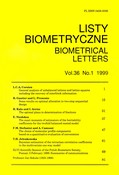
Listy Biometryczne-Biometrical Letters Vol.36(1), 1999, pp.47-59


Molecular profiles obtained by electrophoresis may be exploited in classification problems by using molecular profiles of unknown individuals to predict their group membership. In a reference population, the uncertainty about group membership is reduced if one or more informative profile components are identified through pilot experiments. The size of a molecular profile is virtually infinite because an experiment could include a huge number of different setups (e.g., pairs enzyme-probe) so that from the amplified DNA of an individual thousands of bands could be obtained. Time and cost of assessment put a constraint on the size of molecular profiles utilized in actual experiments. In this paper, pilot experiments are analyzed from the standpoint of statistical decision theory to find informative profile components that should be included in future experiments. The trade-off between cost of the experiment and decrease of uncertainty due to the profile assessment is defined to evaluate the convenience of different actions in a quantitative way. The proposed framework is based on a well known body of knowledge, but the analysis of actual pilot experiments with molecular profiles has to cope with some open problems.

Bayesian inference; decision theory; molecular profiles

